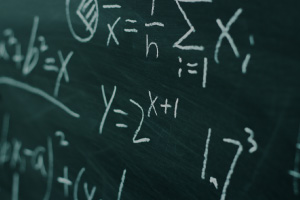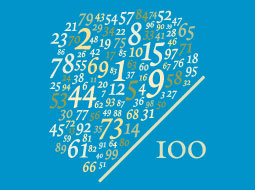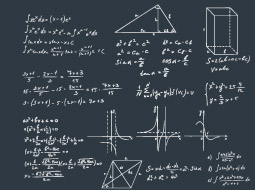Online courses directory (418)
ALISON.com's free online Diploma in Mathematics course gives you comprehensive knowledge and understanding of key subjects in mathematics. This course covers calculus, geometry, algebra, trigonometry, functions, vectors, data distributions, probability and probability and statistics. Math qualifications are in great demand from employers and this math course will greatly enhance your career prospects.<br />
Statistics and statistical methods play a major role in the work environment in areas such as business, science, finance, economics, engineering to mention just a few. It is very important that people are comfortable with reading statistics and using statistical methods. This free online Diploma in Statistics will give you the knowledge and understanding of basic statistical methods such as sampling and collecting data, probability, distributions, regression analysis. By completing this course you will gain the knowledge and understanding to confidently read statistics and apply statistical methods within your daily working environment.
Double affine Hecke algebras (DAHA), also called Cherednik algebras, and their representations appear in many contexts: integrable systems (Calogero-Moser and Ruijsenaars models), algebraic geometry (Hilbert schemes), orthogonal polynomials, Lie theory, quantum groups, etc. In this course we will review the basic theory of DAHA and their representations, emphasizing their connections with other subjects and open problems.
An introduction to dynamical modeling techniques used in contemporary Systems Biology research.
Game Theory, also known as Multiperson Decision Theory, is the analysis of situations in which the payoff of a decision maker depends not only on his own actions but also on those of others. Game Theory has applications in several fields, such as economics, politics, law, biology, and computer science. In this course, I will introduce the basic tools of game theoretic analysis. In the process, I will outline some of the many applications of Game Theory, primarily in economics.
A wondrously romantic belief is that brilliant thinkers magically produce brilliant ideas: Einstein jostles his hair and relativity falls out. We can enjoy these fanciful visions of leaps of genius, but we should not be fooled into believing that they’re reality.
Brilliant innovators are brilliant because they practice habits of thinking that inevitably carry them step by step to works of genius. No magic and no leaps are involved.
Professor Starbird will discuss how habits of effective thinking and creativity can be taught and learned through puzzles and mathematics. Anyone who practices these habits of mind will inevitably create new insights, new ideas, and new solutions.
Ganz gleich in welcher Wissenschaftsdisziplin, Statistik ist das Schweizer Armeemesser für die Behandlung von vielen Zahlen – um daraus wenige Zahlen zu machen. Das klingt unspektakulär, hat aber schon so manchen Studierenden der Human-, Wirtschafts- und Naturwissenschaften an den Rand der Verzweiflung geführt. Dabei ist Statistik überall, in den alltäglichsten Situationen und den komplexesten Forschungsfragen.
In dieser Einführung kümmern wir uns um das Fundament der Statistik, die Wahrscheinlichkeitstheorie. Das klingt schlimm, ist es aber nicht. Wir erfahren etwas über die männliche Sicht weiblichen Intellekts, antike Cassettenhüllen, gezinkte Würfel, Milchreis, Hochrisiko-Sportfeste und vieles mehr, das uns den Einstieg in die Welt der Wahrscheinlichkeit so leicht macht als sei die Statistik auf eine strenge Diät gegangen.
Kursüberblick
Der Kurs beschäftigt sich mit Inhalten rund um das Gebiet der Wahrscheinlichkeitsrechnung. Ausgehend von verschiedene Definitionen für Wahrscheinlichkeit widmen wir uns schnell den praxisnäheren Fragen, die mit Wahrscheinlichkeitsrechnung beantwortet werden können. Wir erfahren den Unterschied zwischen Häufigkeit und Wahrscheinlichkeit, lernen den Satz von Bayes kennen und danach direkt Bernoullis Zufallsexperimente. Diese bringen uns zu den diskreten Wahrscheinlichkeitsverteilungen, von denen wir die Binomialverteilung, die Poissonverteilung und die Hypergeometrische Verteilung näher kennenlernen werden. Danach kümmern wir uns um stetige Wahrscheinlichkeitsverteilungen und deren wichtigsten Vertreter, die Normalverteilung. Links liegen lassen wir während des ganzen Kurses die von Vielen gefürchtete Kombinatorik, die wir nur an zwei Stellen wirklich benötigen.
Lernergebnisse
Am Ende des Kurses wirst Du die grundlegenden formalen Elemente der Wahrscheinlichkeit kennen. Du wirst verstanden haben, was sich Pierre Simon Laplace und Nikolaj Kolmogoroff unter dem Begriff Wahrscheinlichkeit vorgestellt haben. Du wirst mit bedingten Wahrscheinlichkeiten und dem Satz von Bayes umgehen können. Und schließlich wirst Du Dich in vielen Wahrscheinlichkeitsverteilungen zurechtfinden wie der Binomialverteilung, der Poissonverteilung, der hypergeometrischen Verteilung und der Normalverteilung.
Vorkenntnisse
Alles, was Du zum Genuss der Wahrscheinlichkeitstheorie brauchst, lernst Du hier. Du brauchst keine besonderen Vorkenntnisse, denn mehr als Plus, Minus, Mal und Geteilt wird hier kaum gerechnet. Versprochen! Also schau vorbei und lern mit uns die Statistik von einer ganz neuen Seite kennen.
FAQ
Für grundsätzliche Fragen findest du hier die FAQs.
2.01x introduces principles of structural analysis and strength of materials in applications to three essential types of load-bearing elements: bars in axial loading, axisymmetric shafts in torsion, and symmetric beams in bending.
The course covers fundamental concepts of continuum mechanics, including internal resultants, displacement fields, stress, and strain.
While emphasizing analytical techniques, the course also provides an introduction to computing environments (MATLAB) and numerical methods (Finite Elements: Akselos)
This course is based on the first subject in solid mechanics for MIT Mechanical Engineering students. Join them and learn how to predict linear elastic behavior, and prevent structural failure, by relying on the notions of equilibrium, geometric compatibility, and constitutive material response.
This course introduces students to iterative decoding algorithms and the codes to which they are applied, including Turbo Codes, Low-Density Parity-Check Codes, and Serially-Concatenated Codes. The course will begin with an introduction to the fundamental problems of Coding Theory and their mathematical formulations. This will be followed by a study of Belief Propagation--the probabilistic heuristic which underlies iterative decoding algorithms. Belief Propagation will then be applied to the decoding of Turbo, LDPC, and Serially-Concatenated codes. The technical portion of the course will conclude with a study of tools for explaining and predicting the behavior of iterative decoding algorithms, including EXIT charts and Density Evolution.
This course continues the content covered in 18.100 Analysis I. Roughly half of the subject is devoted to the theory of the Lebesgue integral with applications to probability, and the other half to Fourier series and Fourier integrals.
This beginners math course is an ideal introduction to fractions. The tutorial uses an interactive multimedia format and relevant examples to thoroughly examine the topic. It is ideal as a study aid or as a complement to face-to-face classes.
This is an advanced undergraduate course dealing with calculus in one complex variable with geometric emphasis. Since the course Analysis I (18.100B) is a prerequisite, topological notions like compactness, connectedness, and related properties of continuous functions are taken for granted.
This course offers biweekly problem sets with solutions, two term tests and a final exam, all with solutions.
This advanced course considers how to design interactions between agents in order to achieve good social outcomes. Three main topics are covered: social choice theory (i.e., collective decision making), mechanism design, and auctions.
This course will cover the mathematical theory and analysis of simple games without chance moves.
Learn about General Game Playing (GGP) and develop GGP programs capable of competing against humans and other programs in GGP competitions .
8.962 is MIT's graduate course in general relativity, which covers the basic principles of Einstein's general theory of relativity, differential geometry, experimental tests of general relativity, black holes, and cosmology.
This course offers an introduction to discrete and computational geometry. Emphasis is placed on teaching methods in combinatorial geometry. Many results presented are recent, and include open (as yet unsolved) problems.
This free online course in Geometry is for high school and secondary school students. The course will guide you through several different areas of Geometry such as points, lines, angles, triangles, quadrilaterals and circles, as well as transformations and area. The course is divided into ten modules and each module is divided into several lessons. Under each lesson you will find theory, examples and video lessons. This course is ideal for learners who want to gain a comprehensive knowledge and understanding of topics in Geometry which they can build on in later courses.
Geometry and Quantum Field Theory, designed for mathematicians, is a rigorous introduction to perturbative quantum field theory, using the language of functional integrals. It covers the basics of classical field theory, free quantum theories and Feynman diagrams. The goal is to discuss, using mathematical language, a number of basic notions and results of QFT that are necessary to understand talks and papers in QFT and String Theory.
Trusted paper writing service WriteMyPaper.Today will write the papers of any difficulty.




















